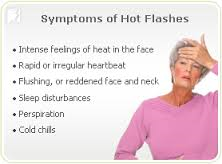The Hot Flash That Wasn't a Hot Flash. A heads up to Middle Aged Women
At Forty-six years old it isn't out of the ordinary to begin seeing signs of getting older, including pre-menopausal symptoms. Many of my friends and colleagues are experiencing the insomnia, hot flashes, night sweats, mood swings, heart palpitations, just to name a few. So it was no surprise to me when I began to feel these incredible warm moments that made me want to rip my clothes off and jump into a glacier fed lake.
One of the most common complaints of middle aged women is hot flashes. Hot Flashes are described by many to be a radiating heat that pulsates from the inner core of their chest out to their extremities.
Even though I was experiencing an elevated body temperature, I found that my symptoms did not exactly go along with the normal hot flash description. My body heat would start in my face and armpit area and creep up into my ears where I felt like my ears were going to burst into flame. Once the temperature in my body began to raise, it stayed there for hours, if not days. I walked around all winter in sleeveless dress shirts while others were cranking up their mini heaters and packing on layers of sweaters. May I say that this past February was the coldest month on record ever for South West Ontario. It was not uncommon for my husband to see me pulling off layers of clothing while running into the house.
I had my doctor check my estrogen levels when I had my most recent blood work only to find that my levels were completely normal. Confused as I was, I assumed that they must be wrong. How could this be? Hot flashes, mood swings, dry skin, blemishes, it seemed to all add up to Menopause.
A few weeks ago my hot flashes were becoming completely unbearable, my heart started racing and I was experiencing tremors in my hands and legs. But still I ignored the symptoms, blaming it on a cold or a virus. I even mentioned this to the nurse at my doctor's office when I was getting my iron injection. Unfortunately she did not pay much heed to my complaints and told me to make an appointment with the doctor for the following week if it still was bothering me. I am disappointed that she didn't even bother to take my blood pressure or pulse.
One night my husband and I were headed off to sleep and he said, "Is that your heart? I can hear it through my pillow." A few days later I could not take it any longer. I left work early and drove myself to the Urgent Care facility to be checked out. There I was triaged and given an EKG to check my heart. My resting heart rate was 128 bpm at that time. A full panel of blood was done to try and figure out what was going on in my body.
After 5 hours the one test they were most suspicious about arrived back from the lab. These results explained that my hot flashes, racing heart, tremors, and many other symptoms I had, were not menopause. In fact my Thyroid was to blame. That little gland in your throat that tells your body how fast your metabolism should be, was over acting, in fact it was hyperactive.
Immediately they put my on Beta Blockers to lower my heart rate. I was put in touch with an Endocronologist (a specialist who works with glandular diseases). At this time I still have more testing to do, and they have not given me a definite diagnosis for my issues, but the specialists are leaning towards a disease called Graves Disease. Graves is an autoimmune disease that can be life threatening if not treated. It is manageable by various treatments and is know in some to go into remission.
If you are a middle aged woman who's premenopausal symptoms are not quite adding up, insist that your doctor do a complete thyroid test to ensure that you are not dealing with something quite different than menopause.
Thyroid problems are very common. In fact I read that one out of every eight people will experience issues with their thyroid at one time or another. Hyperthyroidism is less common than Hypothyroidism and is often overlooked or misdiagnosed as menopause. Thyroid problems are more common in women than men and generally will present themselves between the ages of 20-40.
I am now on the road to recovery and am determined to do all that is in my power to maintain my health for both me and my loved ones. I will not to allow Graves Disease to define who I am.
So if it doesn't add up...check it out!
So if it doesn't add up...check it out!



Comments
Post a Comment